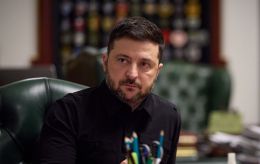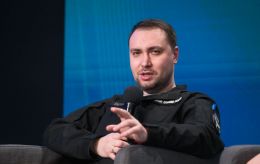Chief Rabbi of Ukraine Moshe Azman: It never hurts to say thank you to Americans
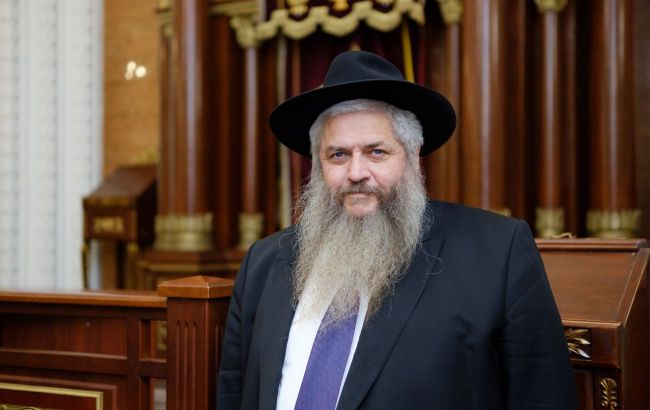 Chief Rabbi of Ukraine Moshe Reuven Azman (photo: Vitalii Nosach/RBC-Ukraine)
Chief Rabbi of Ukraine Moshe Reuven Azman (photo: Vitalii Nosach/RBC-Ukraine)
What consequences has the war between Israel and Iran brought for Ukraine, what sentiments toward Ukraine are observed among American elites, and how should Ukraine work with these elites? Chief Rabbi of Kyiv and Ukraine, Moshe Reuven Azman, answers in an interview with RBC-Ukraine.
Last week, the Chief Rabbi of Kyiv and Ukraine, Moshe Azman, received an award – the Order of Merit, Second Class – from President Volodymyr Zelenskyy.
In addition to his usual active work and volunteering, Azman has recently intensified his efforts internationally, primarily in the American direction. He organized a visit to Ukraine by American pastor Mark Burns, a member of Trump's spiritual advisory board, who saw the consequences of Russian aggression with his own eyes.
Soon after, Azman himself traveled to the United States on an advocacy trip, meeting with numerous American politicians, analysts, and public figures.
Such diplomacy is important and effective for several reasons. First and foremost, it destroys Russian narratives about "Kyiv Nazis," echoes of which still reach the US. Secondly, myths about alleged religious persecution supposedly taking place in Ukraine are also debunked. Finally, among Republicans, there is a very influential wing that actively supports Israel, primarily for religious reasons, so they will certainly listen to the words of a Jewish religious leader.
Azman himself constantly emphasizes in his conversation with RBC-Ukraine: it is necessary to continually demonstrate gratitude to Western allies, especially the US.
"It never hurts to say thank you; it’s better to overthank than underthank. That’s why I say: thank you for helping, thank you to both chambers, thank you to the government, the former government, the current government, thank you to Donald Trump for giving the Javelins, thanks to which Ukraine held out, thank you to Elon Musk, who gave the Starlinks," says Azman.
– Before we talk about your trip to the US, I have to ask about the recent war between Israel and Iran. What do you think its consequences might be, particularly for Ukraine?
– Very good consequences. A week before the war, many were saying that oil prices would rise to 150, but after the war, oil prices dropped. Secondly, it was a brilliant victory over Iran, which is many times bigger and wants to destroy Israel. Israel attacked Iran without losing a single plane, bombing its entire nuclear program, pushing it back – it turned out better than anyone predicted.
As for Ukraine, first of all, Iran is Ukraine’s enemy; this must be stated clearly. It is a strategic ally of Russia – they signed an agreement in February, although Russia, as you can see, didn’t help Iran.
Israel also bombed many interesting things in Iran. Don’t forget that Iran is helping Russia with drones, and we don’t know what else. Maybe few noticed, but in Syria, Israel bombed over 50 Russian MiGs, plus various missiles, plus Shahed drone factories, a lot of things – and all this could later have been used against Ukraine. So, Ukraine should say thank you to Israel for having, indirectly, done Ukraine a great service.
And besides, this entire Axis of evil has already partially suffered defeat. This is Iran, North Korea, China, Russia, Hezbollah, Hamas, the Houthis, and so on.
Iran is a sponsor of terrorism around the world. Now it's getting knocked out of the game, and I think that’s a huge victory. Moreover, the fact that a bunker hidden dozens of meters underground was bombed. That also sends a message to all dictators that if necessary.
– After Israel’s victory, there has been a wave in talks about overall regional settlement: the Gaza Strip, West Bank, agreements between Israel and Lebanon, Syria, and Saudi Arabia. Do you think there is now a real chance to finally achieve stability in the Middle East?
– Of course, this is a unique opportunity. Just a year or two ago, people would have laughed at the mere idea of achieving peace with Syria, with which Israel has been at war for decades. Or with Lebanon, where Hezbollah had 150,000 rockets pointed at Israel. I see miracles there – I don't look at them the way an analyst, politician, or military expert would.
As for Ukraine, I've said it many times: don’t hate Trump, he’s not a friend of Russia – and now that’s suddenly becoming clear in recent days. If you don't want to thank him, then it's better to just stay silent. Give it time, maybe it'll work out.
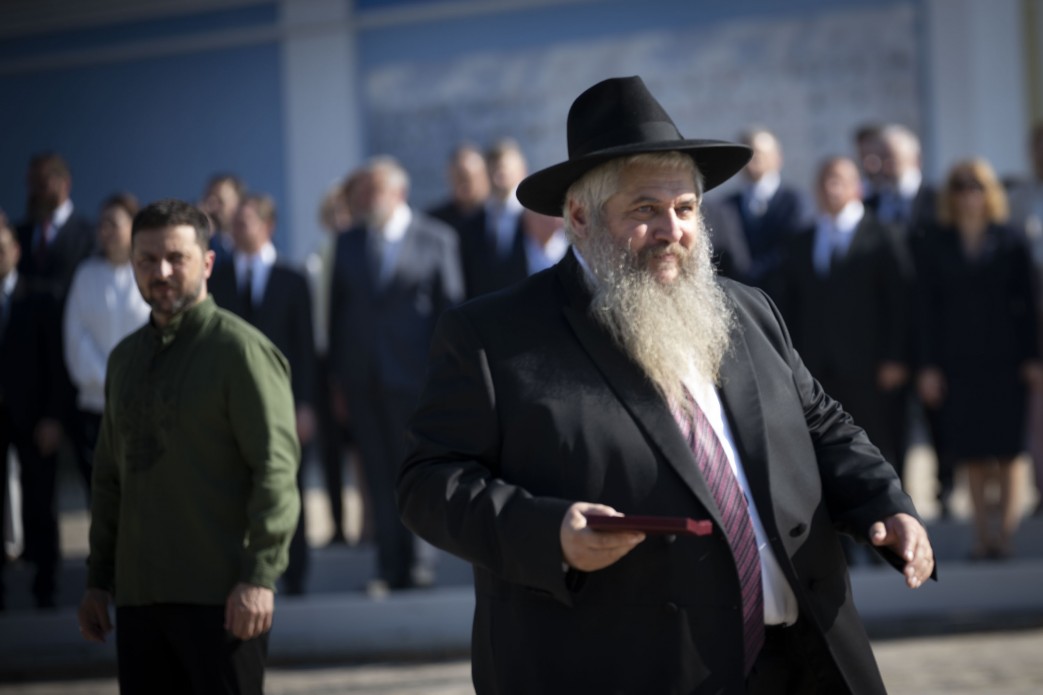
Moshe Azman, after receiving an award from Volodymyr Zelenskyy (photo: president.gov.ua)
– Based on the results of your trip to the US, what conclusions did you draw? What is the attitude toward Ukraine among various representatives of the elite you spoke with — congressmen, senators, respected religious leaders, top analysts? Are they willing to support us?
– Overall, most are tired of the war. I explain to them: you’re tired over here, but in Ukraine, people are losing their property, their loved ones, their lives.
Before the trip, I consulted with American experts about which messages would best resonate with Americans, what internal problems they have over there.
This is not my first trip to the US. My approach in America is always the same: first of all, I thank them for what they’ve done so far, say thank you to everyone, thank you to the American people, thank you to both chambers of Congress.
– Is that really important to them?
– I believe it's important for everyone. It never hurts to say thank you; it’s better to overthank than underthank. That's why I say: thank you for your help, thank you to both chambers, thank you to the government, the former government, the current government, thank you to Donald Trump for giving the Javelins, thanks to which Ukraine held out, thank you to Elon Musk, who gave the Starlinks.
At first, I kept silent when all those events took place in the Oval Office. People usually react to everything harshly, in black and white — I'm an emotional person myself… But you say something in the heat of the moment, and then it affects whether some soldier receives the weapons or medical supplies they need.
It’s easy to hate someone. But the main question is: what will you achieve by doing that? I've said this several times when speaking before the American election, both here and on TV in America. I tell everyone: don’t hate anyone. What if he becomes president? You’ll still have to work with him. Good or bad, it's the choice of the American people, and we’ll have to work with that person.
There will always be someone who’ll later show him who said what. Like, look, these are the people you're helping — ungrateful Ukrainians saying these things about you. The other side, so to speak, is not asleep.
I recently saw one so-called expert on TV. Pure Russian narrative. I don’t know how such people are even shown on Ukrainian television. He was insulting Trump, insulting Biden, saying let's kick out Israel, the Americans, the Poles, everyone.
How can that be? Does Ukraine have so many friends? Why throw them away? Even if the president of some country said something wrong or we don’t like something...
During the trip, I happened to meet a close partner of Elon Musk. We talked for about an hour; he was asking me spiritual questions.
I told him: I want to thank Elon Musk. Please convey personal thanks from Ukrainian soldiers for providing Starlinks. It saved lives. I didn’t say, "Oh, Musk said this or that..." Why? Every person has good and not-so-good sides.
He did something good. He gave those Starlinks. How do I feel about him? That’s not the point. I’m stating the facts. He gave Starlinks – it saved lives and is still saving them.
We don't judge only by sins. For the good, we give an award, a medal, and say thank you. For the bad, there will be someone to judge him.
A person does something good, then says something off — and they immediately start hating him. Turn him into an enemy.
So I say: in any case, we must thank them for what’s been done. Second, I say: please, help, continue to help Ukraine. Because first, second, third, fourth, fifth…
– By the way, what arguments did you make? How did you convince your interlocutors if you sensed they had anti-Ukrainian or simply skeptical sentiments?
– In the current administration, some perceive Ukraine as a country that the Democrats somehow used in political fights. So they’re not angry at Ukrainians or Ukraine. It’s more like — because of Ukraine, something happened, Ukraine was part of the fight against us.
– So, everything is perceived through the lens of domestic politics?
– Yes. They have their own problems. Internal American issues. Cost of living, migrants, national debt, crime, etc.
– And what did you tell them?
– First, I explained that it is in America's own interest for Ukraine to win. Why? Because countries like Iran, North Korea, and China — if they decide that Trump is weak, if he presents himself in a way that he gave up Ukraine, then very bad processes could begin in the world. It’s a question of expediency.
Ukraine is not just defending itself. Our democracy is protecting Europe and America. And there’s no need to send American soldiers, just help Ukraine.
Then there’s the humanitarian aspect, which I’d actually like to put first. I say: How can America, a country of goodness, abandon Ukraine?
Another argument – Ukraine is fighting like Israel. In the new US administration, there are many evangelical Christians who love Israel. I explain that they have the same enemies, proxies - Iran, which is friends with Russia, and North Korea. I say: This is the Axis of evil.
There's also the Budapest Memorandum — there's a lot one could bring up.
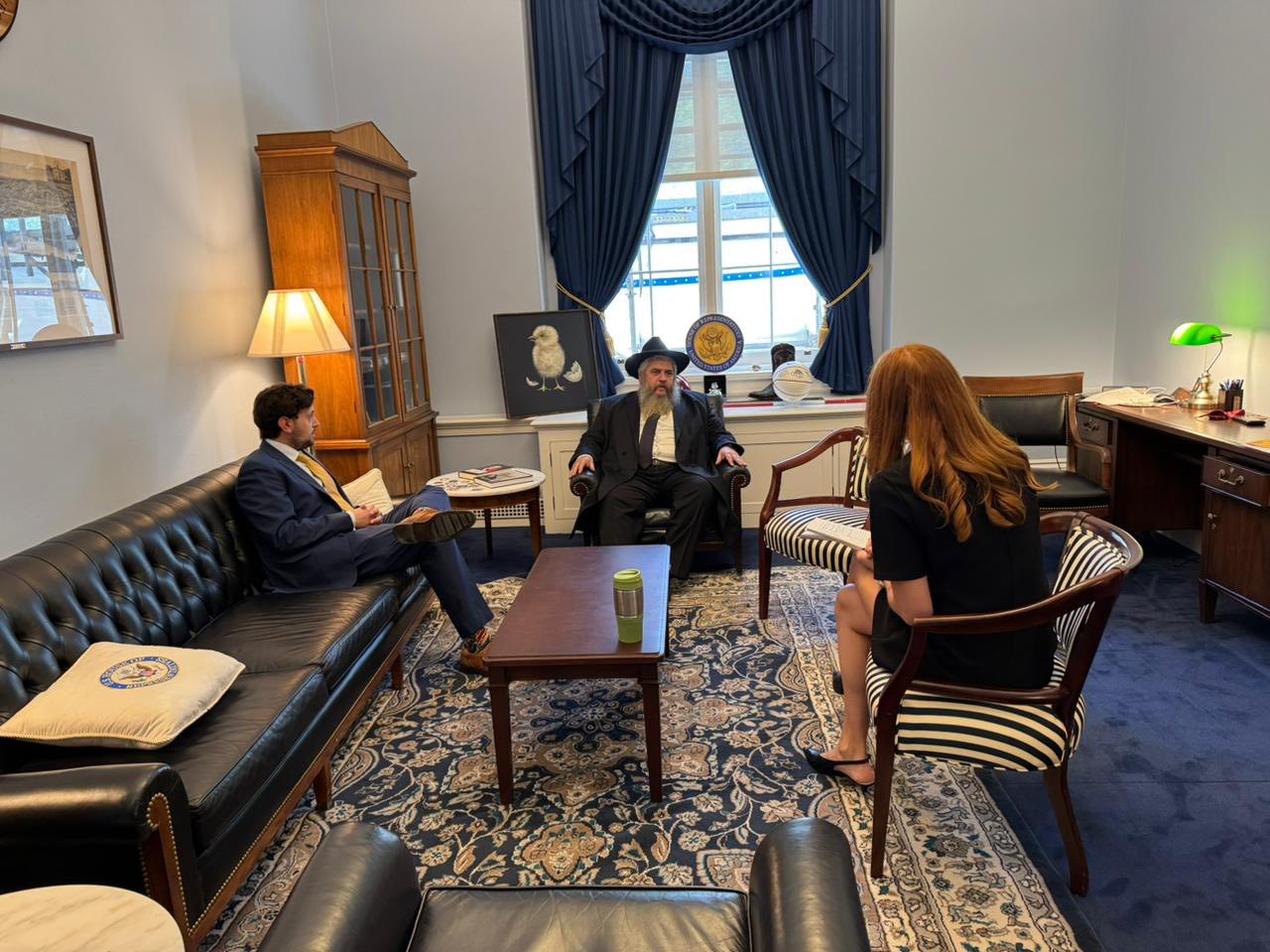
Moshe Azman during his trip to the US (photo: facebook.com/chiefrabbiua)
– And how did your interlocutors react to these arguments: congressmen or, say, analysts from the Heritage Foundation?
– I didn't even know what the Heritage Foundation was. I was told they're a big deal. And that they were somehow not in favor of Ukraine, and that they conveyed this directly to Trump.
I had a wonderful meeting, a very long, wonderful meeting.
– Were you heard? You were definitely listened to, but were you heard?
– The director of the Heritage Foundation was there, and people from various departments of that center.
I don’t know how they heard me, what they’ll do next, but there was an understanding.
Some people immediately attack, saying: Your government, corruption, everything was stolen. And I say: I don't represent the government, I'm a religious person, I'm Jewish, I'm a rabbi. I say: let me just try to explain a few things to you. At first, I didn't think they would hear me at all. They could have said: You don't represent anyone. Why should we talk to you? But they listened to me and they heard me.
– Overall, when you heard some Ukraine-skeptical theses or opinions, were they caused by a lack of knowledge, Russian propaganda, or stereotypes? Or by the position that the United States, in principle, should not actively deal with faraway Eastern Europe, as they have plenty of their own problems?
– Let me explain. Try to understand the thoughts of another person — how would you act in their place?
Imagine you're a voter of Donald Trump, a supporter of the Republican Party of Donald Trump, or Trump himself. You’ve had nothing bad associated with Ukraine, in principle. But there's hatred, the Democrats are fighting you — I'm not saying who is good or bad, just facts. They are fighting against you; they want to imprison you.
All the mainstream media are hating on you, plus this impeachment, which was connected to Ukraine — everything is about Ukraine, everything circles around Ukraine. He has kids, and imagine: here’s this Ukraine, because of which your father has problems — maybe Ukraine itself is not to blame, but the Democrats are trying to come up with something about Trump through Ukraine.
So the voters look at Ukraine, and they get the impression that Ukraine equals the Democrats, that it’s a stronghold of the Democratic Party, that elections will be lost because of Ukraine.
But it’s not the thing that they are for Russia. Ronald Reagan, a famous Republican president who is an icon for many, dismantled the Soviet Union. They are against the Soviet Union, and Russia positions itself as the heir to the Soviet Union. So, they can’t be for Russia.
– Still, in the MAGA movement there is a certain and very loud group of people, often from the media or related circles, who are explicitly pro-Russian, based on the fact that they support conservative values, are against all those liberals, LGBT, etc. — and Putin is also against them, so there’s a kind of ideological closeness.
– Hitler was also against many things. But that doesn’t mean that if someone shares an opinion with someone else, you have to support that person completely. That’s the other extreme. If the Democrats put all these movements on a pedestal and started imposing them, then on the other side, this is just the other extreme.
And Ukraine, in their perception, is "the Democrats." And Russia, therefore, attacked it, and then all those narratives follow.
If I were given half an hour to talk to Trump, believe me, I would find what to say to him.
– Do pro-Israel Republican circles understand that Russia is actually a country with an extremely high level of antisemitism, including everyday antisemitism?
– I tell everyone that Russia and Iran are allies. The Shahed drones that attack us daily are then directed toward Israel.
– They give weapons to the Houthis to attack Israel, and they give weapons to Russia to attack Ukraine.
– Absolutely right. There’s another question that really concerns me. Why is the Iranian embassy operating openly here? How does it function here, when we’re attacked by Shaheds daily? If Iran shot down a Ukrainian plane even before the full-scale invasion...
– And what reaction did you see to your parallels between Russia and Iran?
– Let me give you an example. Pro-Palestinian demonstrations are taking place in Europe and around the world. They shout "from the river to the sea." Most of those who shout, first of all, don’t understand from which river to which sea. Secondly, this is a call for the destruction of Israel. Complete destruction.
I had a story during the trip. I was standing in line to enter Congress to take part in a hearing. In front of me and behind me were pro-Hamas provocateurs. Pro-Palestinian. Mostly Americans.
They were standing there, shouting slogans — everyone's used to it by now. I was standing quietly. They came up and started asking: "What do you think about the killing of children in Gaza?" I replied: And what do you think about the hostages being tortured, abused for almost two years now? Zero reaction, they just kept shouting their stuff. I asked: What do you think about Russia bombing Ukraine?
"This is different." Among them, many are actually pro-Russia. There’s nothing to talk about with such people. I turn to them and say: You are fascists, because Hamas killed, raped, and burned Jews, and you support Hamas. That means you are fascists and Nazis! They started justifying themselves: "Oh, we're not…", "We have nothing to do with it."
I have zero tolerance for such people. Because they're stupid. Why stupid? Because they don't know — ask them — what Palestine is, where it is located.
And the top of all — "gays are for Palestine." They throw gays off buildings there, they shoot them, and so on.
– Of all your meetings in the US, the one with Steve Witkoff probably got the most media attention. Tell us how it happened, what you talked about?
– I talk to everyone about the same thing.
It was an unplanned meeting. I just saw him at one event, right after I arrived in Washington, literally the first event, at the embassy.
I was introduced. I began — I started from afar: I said, I was born in Leningrad (St. Petersburg), and you were there recently. So, I said I came from Ukraine, and so on.
He was there, in Russia. Putin spoke to him personally several times. Probably, Putin told him: I’m for peace, but they’re this and that, Nazis, and so on.
And I thought: since the Almighty gave me this meeting, I need to use the moment — whatever I manage to convey to him, I’ll convey. And then maybe I need to try to meet with him again, if such an opportunity arises.
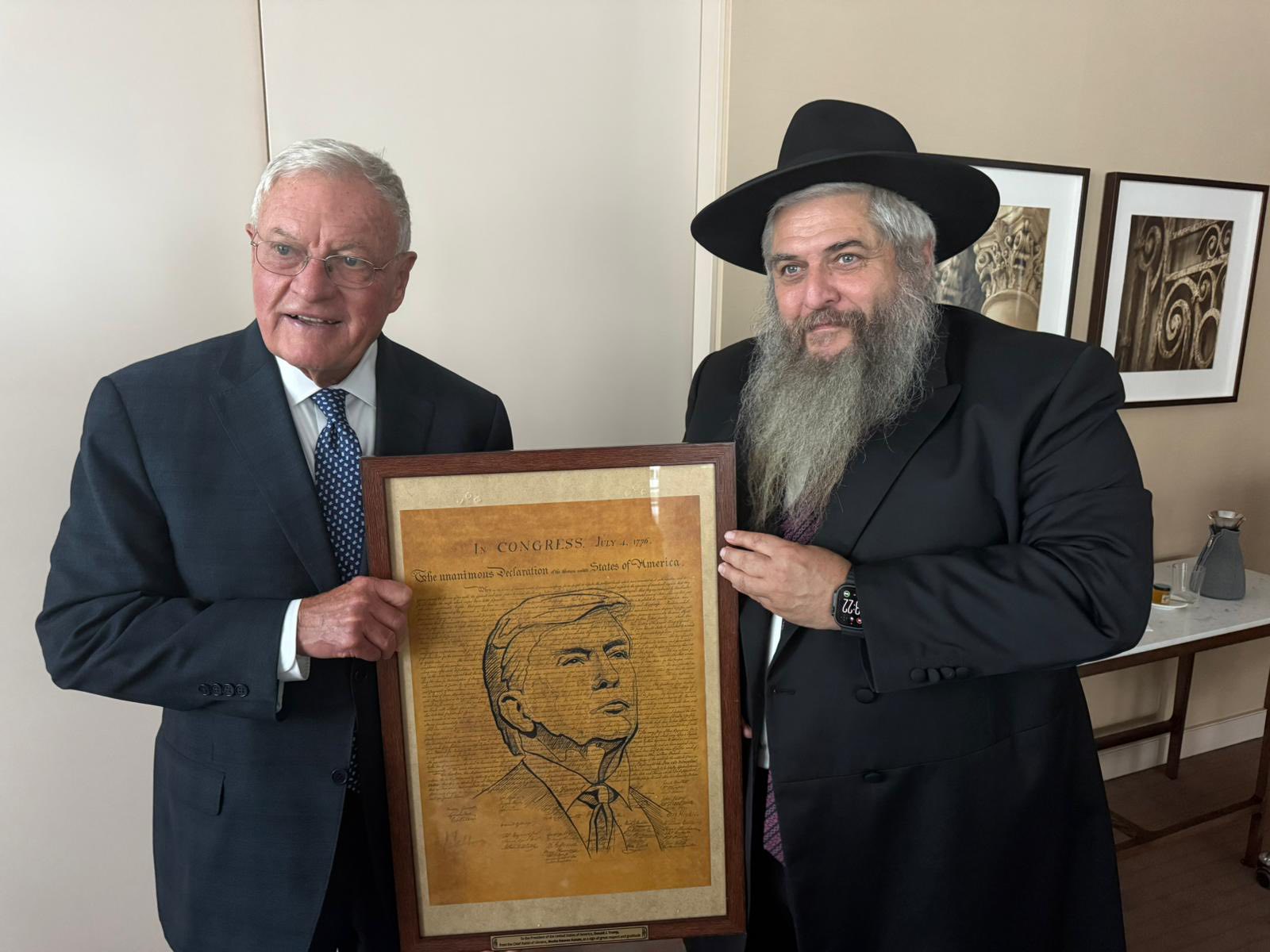
Moshe Azman and Trump's special envoy for Ukraine, Keith Kellogg (photo: facebook.com/chiefrabbiua)
– You are actively engaged in religious diplomacy. How actively has Ukraine used this tool over the past 3.5 years, particularly in working with such a religious community as the American one?
– Probably not actively enough. By the way, I said this a few years ago already: This line should be used too; not only diplomats and MPs should be doing the work. All lines should be used.
Let me explain: look, Ukraine, like Israel, is perhaps partially losing the information war. It is winning globally, but in this audience, it is losing.
Israel is fighting, Ukraine is fighting – maybe they just don’t have time for this. You know, when all forces and resources are directed at the fight, probably there just isn’t time left for this. Israel, for example, often just waves it off and says: We won’t even waste time on that.
– Like, you don't like us – well, then don't like us.
– Yes. But this needs to be done; this shouldn’t be neglected. And there's a lot of work here: people are divided into the brainwashed and those who don't know what they're doing.
When they say, all Russians are bad... I don't think so. There are, I don't know how many, 30% of Russians who support Ukraine – that's tens of millions. So, let's say, well, when they say here, let's say, oh, don't, you know, deal with Russians – I don't think that way. There are, I don't know how many, maybe 30 percent who, so to speak, are actually for Ukraine – that’s big, that's tens of millions.
– You think it's that many?
– I don’t know. But I know people who are for Ukraine, and many abroad too, and Russians who are for Ukraine. Again, we shouldn't make enemies. On the contrary, we should be looking for friends.
I have a Ukrainian audience. They want me to speak Ukrainian, but I also have to use Russian. Why? In order to reach Russian-speakers who live in Europe, in America, in Israel, in Cyprus, and even in Russia itself. It works.
